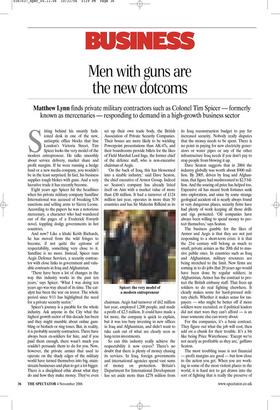Men with guns are the new dotcoms
Matthew Lynn finds private military contractors such as Colonel Tim Spicer — formerly known as mercenaries — responding to demand in a high-growth business sector Sitting behind his smartly fashioned desk in one of the new, antiseptic office blocks that line London’s Victoria Street, Tim Spicer looks the very model of the modern entrepreneur. He talks smoothly about service delivery, market share and profit margins. If he were running a hedge fund or a new media company, you wouldn’t be in the least surprised. In fact, his business supplies tough blokes with guns. And a very lucrative trade it has recently become.
Eight years ago Spicer hit the headlines when his private military company Sandline International was accused of breaking UN sanctions and selling arms to Sierra Leone. According to the papers he was a notorious mercenary, a character who had wandered out of the pages of a Frederick Forsyth novel, toppling dodgy governments in hot countries.
And now? Like a khaki Keith Richards, he has moved from the wild fringes to become, if not quite the epitome of respectability, something very close to it. Sandline is no more. Instead, Spicer runs Aegis Defence Services, a security contractor with close links to government and valuable contracts in Iraq and Afghanistan.
‘There have been a lot of changes in the way this industry works in the past ten years,’ says Spicer. ‘What I was doing ten years ago was way ahead of its time. The catalyst has been the war on terror. The whole period since 9/11 has highlighted the need for a private security sector.’ Spicer’s journey is a parable for the whole industry. Ask anyone in the City what the highest growth sector of this decade has been and they might mumble about online gambling or biofuels or ring tones. But, in reality, it is probably security contractors. There have always been ex-soldiers for hire, and if you paid them enough, there wasn’t much you couldn’t persuade them to do for you. Now, however, the private armies that used to operate on the shady edges of the military world have turned themselves into big, mainstream businesses and plan to get a lot bigger. There is a disciplined ethic about what they do and how they make money. They’ve even set up their own trade body, the British Association of Private Security Companies. Their bosses are more likely to be wielding Powerpoint presentations than AK-47s, and their boardrooms provide billets for the likes of Field Marshal Lord Inge, the former chief of the defence staff, who is non-executive chairman of Aegis.
‘On the back of Iraq, this has blossomed into a sizable industry,’ said Dave Seaton, the chief executive of Armor Group. Indeed so: Seaton’s company has already listed itself on Aim with a market value of more than £30 million. It had a turnover of £124 million last year, operates in more than 50 countries and has Sir Malcolm Rifkind as its chairman. Aegis had turnover of £62 million last year, employed 1,200 people, and made a profit of £2.5 million. It could have made a lot more, the company is quick to explain, but it was too busy investing in new offices in Iraq and Afghanistan, and didn’t want to take cash out of what are clearly seen as long-term investments.
So can this industry really achieve the respectability it now craves? There’s no doubt that there is plenty of money chasing its services. In Iraq, foreign governments and international agencies spend vast sums of money on protection. Britain’s Department for International Development has set aside more than £278 million from its Iraq reconstruction budget to pay for increased security. Nobody really disputes that the money needs to be spent. There is no point in paying for new electricity generators or water pipes or any of the other infrastructure Iraq needs if you don’t pay to stop people from blowing it up.
Dave Seaton suggests that in 2004 the industry globally was worth about $900 million. By 2005, driven by Iraq and Afghanistan, that figure had mushroomed to $2.5 billion. And the soaring oil price has helped too. Expensive oil has meant fresh fortunes sunk into exploration, and since by some strange geological accident oil is nearly always found in very dangerous places, security firms have had plenty of work keeping all those drills and rigs protected. ‘Oil companies have always been willing to spend money to protect themselves,’ says Seaton.
The business gamble for the likes of Armor and Aegis is that they are not just responding to a short-term crisis: it is that the 21st century will belong as much to small, private armies as the 20th did to massive public ones. In countries such as Iraq and Afghanistan, military resources are being stretched to the limit. New firms are coming in to do jobs that 20 years ago would have been done by regular soldiers; in Afghanistan, Armor has the contract to protect the British embassy staff. That frees up soldiers to do real fighting elsewhere. It clearly makes sense for hard-pressed military chiefs. Whether it makes sense for taxpayers — who might be better off if more soldiers were recruited, or if political leaders did not start wars they can’t afford — is an issue someone else can worry about.
For the companies, it’s a basic contract. They figure out what the job will cost, then add on a chunk for their trouble. It’s a bit like being Price Waterhouse. ‘Except we’re not nearly as profitable as they are,’ guffaws Seaton.
The most troubling issue is not financial — profit margins are good — but how close to the action you get. When you are working in some of the most violent places in the world, it is hard not to get drawn into the sort of fighting that is really the preserve of


















































































































 Previous page
Previous page